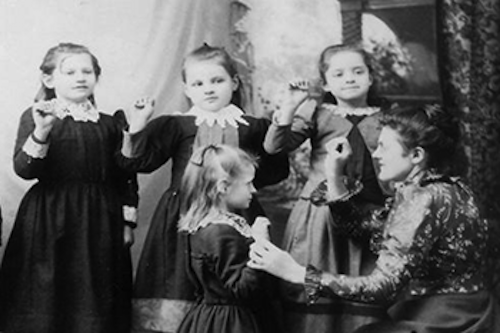- Despite being confined to a wheelchair, Michonne is the world’s foremost expert on aquarium snails.
Burdened by Glasses
First, the phrase confined to a wheelchair suggests something akin to a prison sentence. Like any assistive technology, a wheelchair is a tool. I am very short-sighted and would have considerable difficulty navigating the world without my glasses, but I’d never describe myself as confined behind eyeglasses or glasses-bound. A good rule of thumb is, if you wouldn’t say it about glasses, don’t say it about wheelchairs (or prosthetics, hearing aids, white canes, etc.).
- Despite using a wheelchair, Michonne is the world’s foremost expert on aquarium snails.
Second, the sentence opens with Michonne’s disability, as if that’s the most important thing about her. What, if anything, does it have to do with her being a snail expert? Why mention it at all?
- Michonne is the world’s foremost expert on aquarium snails.
Now if, for example, you were writing a piece about people with disabilities in the sciences, then Michonne’s wheelchair use might be relevant. Or you might choose to include it as a way of broadening the representation of disabled people in the media.
- Michonne, who is the world’s foremost expert on aquarium snails, uses a wheelchair.
- America’s thirty-second president, Franklin Delano Roosevelt, used a wheelchair.
Inspiration Porn
In the first two example sentences, the word despite points to another ableist pitfall: the “overcoming disability” narrative. You may have seen those posters of anonymous Paralympians or cute disabled kids, blazoned with What’s your excuse? In other words, “If I can run a marathon on prosthetic legs, then you can do whatever you set your mind to!” In this genre, dubbed “inspiration porn” by disability activists, the raison d’être of people with disabilities is to inspire the non-disabled. As such, they are expected to be overachieving, uncomplaining, and preferably photogenic. Slackers need not apply.
Of course disabled people do have to overcome obstacles that non-disabled people don’t: inaccessible spaces, inadequate transportation, and high medical costs, to name a few. But these societal inequities don’t fit neatly into the you-can-do-it, pull-yourself-up-by-your-bootstraps narrative our culture prefers.
“Inspirational” stereotypes not only objectify disabled people, they penalize anyone who, for whatever reason, can’t superhumanly transcend their disability. No amount of determination and positive thinking will wipe away a chronic illness or magically summon an entrance ramp.
Variation Is the Norm
There are as many experiences of disability as there are disabled people.
Among deaf people, some use the term hard of hearing while others identify as Deaf—that is, part of the Deaf community and culture. Whether someone signs or speaks, uses hearing aids or doesn’t, calls themselves hard of hearing, deaf, or Deaf—all this is highly individual.
- Beethoven famously went deaf by age forty-four.
- The Deaf storyteller signed and her interpreter translated for hearing audience members.
And just as there are multiple spoken languages, there is more than one sign language: American Sign Language (ASL), langue des signes québécoise (LSQ), Australian sign language (Auslan), British Sign Language (BSL), Navajo Sign Language, Ghanaian Sign Language (GSL), and so on—around 300 altogether, according to Wikipedia.
Similarly, visually impaired can mean anything from partially sighted to completely blind. Many people with limited vision use assistive technology such as screen readers or Braille displays, so when you’re adding visual content to your writing, be sure to include descriptive text below your images or in the alt tags.
Mental Illness and Neurodivergence
Avoid using words like crazy or psycho, which are dismissive at best and hurtful at worst. And disregard myths about violent behaviour: people with mental illnesses are much more likely to be victims of violence than perpetrators.
Try to keep your language focused on the person rather than the illness.
- Schizophrenics may show a variety of symptoms. ☓
- People with schizophrenia may experience a variety of symptoms. ✓
- Her sister Trinh is bipolar. ☓
- Her sister Trinh has been diagnosed with bipolar disorder. ✓
Avoid struggles with as a general description; save it for situations of actual distress.
- Branislav struggles with depression. ☓
- Branislav lives with depression. ✓
- Branislav manages depression. ✓
- During that year, Branislav struggled with depression off and on. ✓
The adjective neurodivergent is used to describe people with autism, dyslexia, attention deficit disorder, Down syndrome, and other conditions. It means “neurologically different from the majority,” and its opposite is neurotypical. The advantage of this term is that it casts people as acceptably different rather than “defective.” In the same vein, avoid phrases like suffers from or afflicted with in favour of has or lives with.
- My teacher, who has cerebral palsy, sometimes comes to class in a wheelchair.
- Diana shares a house with six other people with intellectual disabilities.
There Are No Perfect Words
In this post I’ve mostly followed the “people first” rule of thumb (e.g., people with chronic illness instead of the chronically ill ), but many people consider their disability part of their identity. For them, disabled people is preferable to people with disabilities, and I’m autistic (or Autistic) is more empowering than I have autism.
If you’re writing about a real person, always ask what terms they prefer. If you’re inventing a character, then you’ll have to do your research to determine how they would describe themselves. Follow blogs by disabled writers and read articles by disability activists. Since the popularity of different terms changes over time (as in all corners of English), your research is never really over.
This is the third post in the Inclusive Language series. The others are the introduction, Gender and Sexual Orientation, Race and Ethnicity, and Class and Income.
To keep up with new posts, follow Grammarlandia on Facebook. To support the blog and get access to bonus content, become a patron at patreon.com/grammarlandia.




